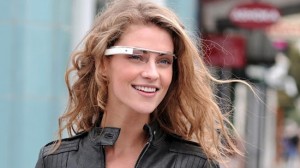 Shortly we are to be introduced to an alarming and wildly new technology in mobile media.
Shortly we are to be introduced to an alarming and wildly new technology in mobile media.
JUST in case not everyone’s heard, within 18 months we are to be introduced to a completely new technology in mobile media. The product is called Google Glasses, a pair of regular-looking glasses but with transparent computer screen lenses and earphones. As you walk along the street, everything you could possibly want and need is transmitted to you.
According to promotional material, if you look at a restaurant name and say ‘‘review’’, info will flash up immediately; you can arrive at your bus stop to be told, ‘‘5.30 bus cancelled, next closest bus is . . .’’ (map provided). The glasses can take photos and record videos, and send them out to people; give directions; flash you what’s on at the theatre you’re passing and book your tickets; flash your email messages and phone calls at you for you to accept or decline by voice command.
You can Skype or read the paper, or call up websites by moving your neck as a mouse. There’s face recognition, and a tracking device allows you to pinpoint the whereabouts of your friend who is late.
But there are psychological dangers — or, as one critic has already dubbed it, ‘‘sanity issues’’. The glasses are always throwing things at you: news, info and advertisements. Everything your eyes look at will inspire ads to be flashed at you.
There’ll be no respite from information overload, leading to extreme stress. And what will become of our species from a neuroscience perspective?
Even before the advent of GGs, prominent British neuroscientist Susan Greenfield was warning of the dangers of social media for child brain development. She says that as kids become more involved in interactive media, using screens and words instead of face-to- face contact, they are missing out on essential skills necessary to foster empathy: reading facial expressions, recognising emotions, smelling fear, or picking up on body language. She claims we are breeding generations of self-absorbed narcissists and that new media will ultimately change the structure of the human brain as neuro-pathways linked to empathy shrink.
Virtual, augmented reality will exacerbate this. Forget about smelling the roses. Users are cut off from their surrounds as they walk around in an isolated bubble of self-sufficiency, pretending to be listening to you behind dark GGs as they read Facebook.
But the biggest danger could at least be a planetary advantage. The glasses will almost certainly stymie population growth. I would imagine we’ll lose about one in three of our species weekly as they fall into gutters and potholes, walk over the edge of tall buildings, or get knocked over during a Skype conversation or while watching porn. As the adage goes: ‘‘There are none so blind as those who will not see.’’

Wow Ruth,
I always enjoy your posts as yours are so different. In fact I have stopped blogging newspapers and spend my time reading your startling latest episode.
Well this new technology will really startle the world. Already I am tired of people speaking on mobiles, continually bumping into me as I walk around, or shop in malls. These days I wear boots so my toenails are not broken by females swooning into the mobile about the weather. I wouldn’t mind if they were carrying on a conversation about love, but no, its all about tittle-tattle.
Never mind this is all going to change in the near future. A prominent scientist has indicated that science has nearly perfected a robot that will soon overtake human intelligence, thus we will have robots running things in everyday life.
Right at this moment they are experimenting and nearly there with with robots driving cars, this will save all the enormous accidents that happen daily. I for one will be pleased with robots driving cars, then I can read, talk or sleep, instead of concentrating on driving, which I find totally boring as I feel like a robot being tied to the steering wheel, looking at the monotonous highway reaching into the never never land.
The scientist also advised that already humans are falling in love with robots and that will be the norm one day in the future. We can expect vast hordes of the population to be talking to robots instead of humans.
The Mars spaceships are proving to be more useful than humans as they don’t need food or water and don’t get upset if they don’t get any romance, nor sex.
Realistically, we humans will never go the far reaches of the universe for many hundreds of years, we need too much clutter to live for long periods of time without home comfort, plus our minds are continually in a state of siege. Therefore, the exploration of the universe will be carried out by robots.